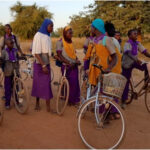A cry for help from the Sahara desert. Thousands of people robbed, tortured and abandoned in the desert.
Sahara, in the tiny village of Assamaka in Niger, a humanitarian tragedy of devastating proportions takes place. In recent months, more than 7,000 sub-Saharan migrants have been brutally expelled from Algeria, stripped of what little they owned and subjected to unspeakable abuse. This unprecedented migratory flow, which took place between February and April, is putting a strain on the reception capacity of the camp managed by the IOM, which can accommodate only 2,000 people.
The testimonies of the migrants tell of a real circle of hell
After being dragged to detention centers, they were robbed of their belongings and subjected to inhumane torture; subsequently, they were loaded onto trucks, driven beyond Tamanrasset and abandoned in the desert 15 kilometers from the border with Niger, Assamaka, in the darkest hours of the night. Only the strongest manage to arrive in the “village” of Assamaka before dawn the next day, desperately seeking help for those who were unable to march along a perilous path across the no man’s land between Algeria and Niger . Among the weakest there are inevitably women, children and injured men who have suffered the most serious consequences of these brutal expulsions.
Assamaka, a melting pot of countries, ethnic groups and dreams lashed by the sand
The diversity of migrants facing this terrible situation is astonishing. Coming from over 20 different countries, mainly from sub-Saharan Africa, these humans are desperately looking for a safe place to take refuge and survive.
However, the resources available in Assamaka are extremely limited. The village of miserable bank houses, inhabited by just under 2,500 people, has only three wells. One is off-duty, one is dedicated to the local medical center and one provides to the community. Drinking water is a rare and precious commodity, and migrants are forced to undertake long walks in search of other sources of water. The situation is particularly oppressive, especially considering that in the scorching heat of the region, temperatures exceed 46 degrees in the shade and force these desperate people to take refuge in the corners of shade that the low, sun-dried mud buildings can offer them. Despite the efforts of humanitarian organizations to provide healthcare and alleviate suffering, the situation of migrants remains desperate and unbridgeable but they remain out of sight, away from Europe and away from our consciences.


